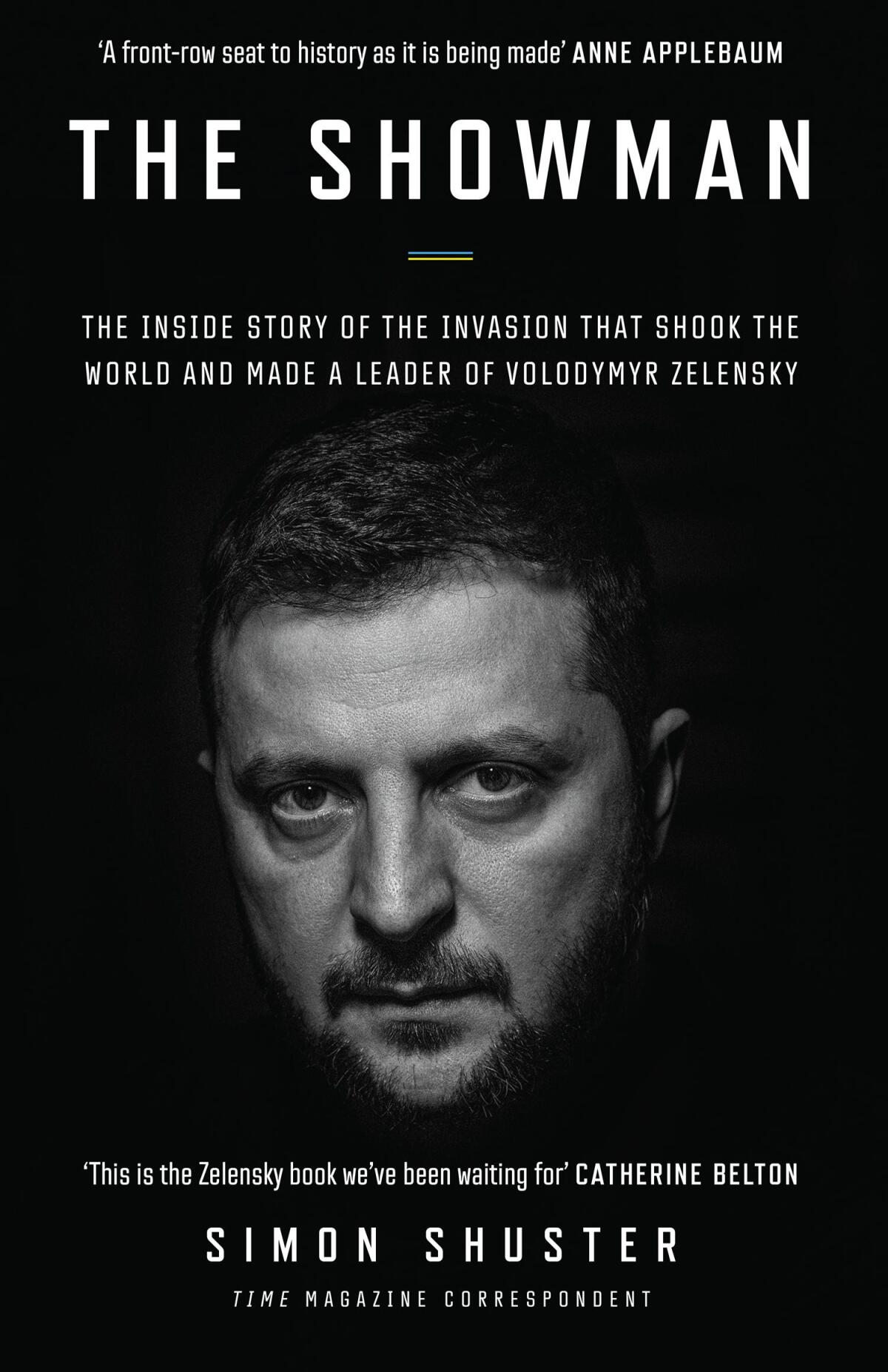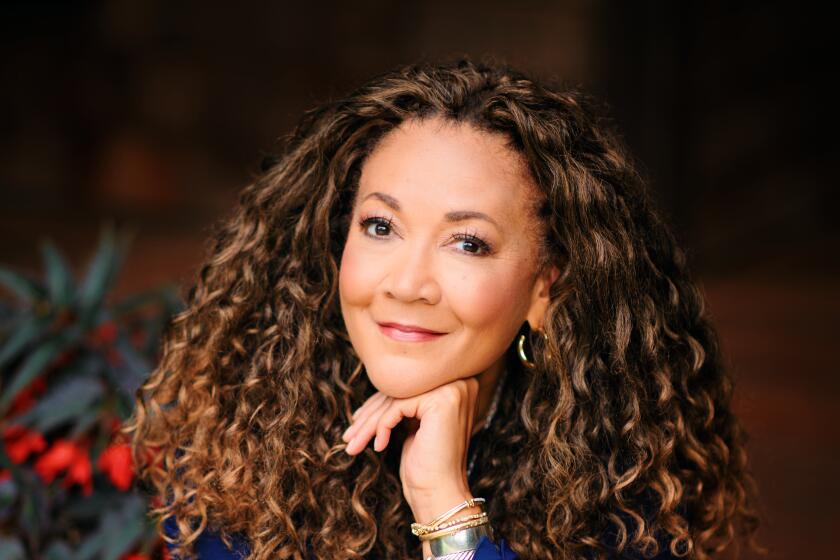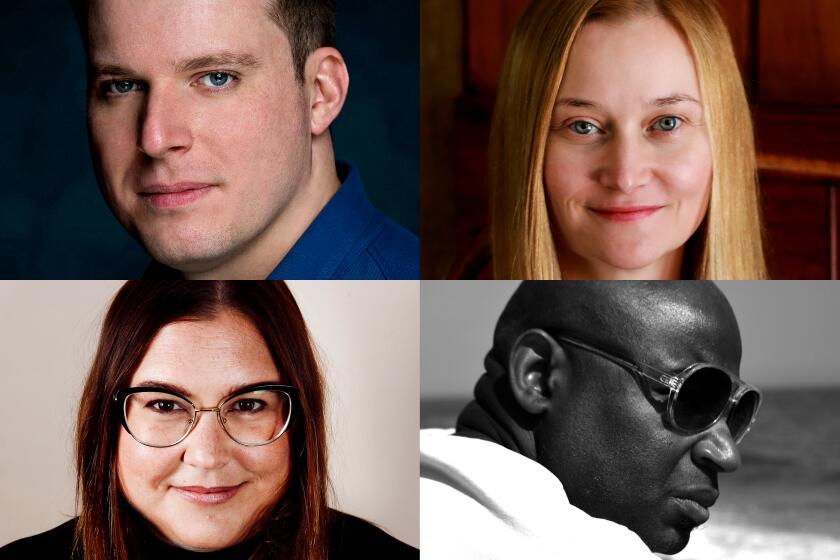Author of new book on Ukraine’s Zelensky says Russian invasion turned him into ‘this bulldog’

- Share via
On the Shelf
The Showman: Inside the Invasion that Shook the World and Made a Leader of Volodymyr Zelensky
By Simon Shuster
William Morrow & Company: 384 pages, $33
If you buy books linked on our site, The Times may earn a commission from Bookshop.org, whose fees support independent bookstores.
On a train ride back from the front lines, Ukrainian President Volodymyr Zelensky cautioned journalist Simon Shuster that his nation’s fight wasn’t just for its own future.
“If they devour us, the sun in your sky will get dimmer,” Shuster quotes Zelensky saying, of the Russian imperialists, in the journalist’s new book, “The Showman: Inside the Invasion that Shook the World and Made a Leader of Volodymyr Zelensky.”
Shuster, a Time magazine foreign correspondent, has covered Zelensky since his presidential campaign began, a relationship that helped him gain extraordinary access not just to the president but to his inner circle and family. Shuster clearly admires Zelensky but strived for objectivity, a fact further complicated by his Ukrainian roots; his aunts and a niece had to flee Odessa when the fighting started while an uncle, a doctor, stayed behind to treat the wounded.
“My family history helped me understand the place and feel these events closer to the heart but I had to struggle with all this in terms of maintaining objectivity,” he said by video recently. “Hopefully I did a good job, but it’s never an exact science.”
This conversation has been edited for length and clarity.
Ukraine’s president, Volodymyr Zelensky, talks about the winter campaign against Russia, the Israel-Hamas war, elections and domestic arms production.
His refusal to stand down or flee when the invasion came inspired his country. Beyond that act or any tactical decisions, how important was the performative aspect of his presidency?
He developed in his mind an image of what a wartime leader needs to act like, inventing this role as he went. I don’t mean to trivialize it, but his specialty in comedy was improv. Someone throws out, “You’re a doctor” or “You’re a clown” and you have to embody the role and situation.
In one interview he described giving himself a pep talk in the early hours of the invasion, saying, “The world is watching.” He embodied this persona so fully that it became impossible to find remnants of the old Zelensky, who was much more happy-go-lucky, jovial, relaxed. He turned into this bulldog, armored figure that was stubborn and uncompromising, intent on victory.

If Ukraine manages to force Russia out of the Donbas and Crimea, how would Zelensky win over the pro-Russian people who have been living with a barrage of Russian propaganda for at least a decade?
The military leadership thinks in terms of pushing the Russians out but Zelensky thinks about the aftermath: How will we bring these people back? He does have a plan and a vision — there’s an entire ministry that is devoted to that question called the Ministry of Reintegration of [Temporarily] Occupied Territories.
One thing he said is essential is turning off the Russian propaganda channels and turning on the Ukrainian TV so that he could speak to them. He does still have a great deal of confidence in his ability to win those people back and explain to them, “We are your home. We are your government. We’re here to help you.”
Still, it makes him more nervous and uncertain in the way he talked than even the military challenges, which are gargantuan. It scares him quite a lot.
Journalist Michele Norris gave her vast audience a single prompt: Send in six words about race. She talks about the result, ‘Hidden Conversations.’
Does that focus on victory hinder negotiations with Vladimir Putin, who has promised the same to Russia, especially if it meant sacrificing some portion of eastern Ukraine?
It would be an extremely unpopular position to take. Some people in the military and political leadership have suggested looking into difficult territorial concessions but they’d have to begin preparing the public for that kind of eventuality. That’s almost a taboo subject these days but if he were to move in that direction, he would need to use his skills as a communicator to prepare the public.
What Zelensky has been doing is promising victory and often saying it’s coming soon. Some in his circle want him to ease up on that messaging a little bit and start maybe leveling with the Ukrainian public a bit more. Zelensky has not yet shown much of an inclination to do that. I don’t have an opinion and I don’t presume to imagine what kinds of decisions and pressures he faces.
If public opinion in Ukraine shifts to where the people, according to opinion polls or elections, decide they want a different resolution to this war, whether it be through a settlement, a freezing of the line, he will adjust based on, I think, popular opinion.
You quote a Ukrainian as saying, “The dogs will start barking soon,” meaning criticism of Zelensky, tamped down during the heroic early days of the war will soon start surfacing. Will the military stalemate and declining support abroad for funding hasten that day? And what would that mean for the war effort?
The dogs have started barking. The mayor of Kyiv, Vitali Klitschko, who’s a very influential politician, suggested Zelensky is taking Ukraine in an authoritarian direction, comparing some actions to those of Putin in terms of repression of political forces.
Things will intensify, especially around the mistakes made in the lead up to the invasion. That’s what the quote was about. Zelensky did not believe the invasion was coming. The military leadership was pushing for more preparations, like digging trenches and stockpiling weapons, but Zelensky’s team was more concerned about scaring the public and capital flight that would suffocate the Ukrainian economy, which led to weaker defenses.
He has answered for it in public statements but mostly it’s been, “Let’s look at that after the war,” so he hasn’t had to answer for it in practical terms and inevitably he will.
Spring will be all about the heavy hitters. But this winter brings 4 blazing thrillers well worth your time — from a medical mystery to a racial reckoning.
He not only wants to win, but to repair what he sees as the nation’s damaged psyche, caused by years of Soviet propaganda and Russian violence. Is all this feasible?
The book traces the evolution of his attitudes toward the Soviet past. It begins with nostalgia and a belief that the Soviet Union achieved a great deal and the Russians and Ukrainians are brotherly nations. Those attitudes are completely transformed — he feels revulsion toward the Soviet past and has tried to rip out of himself these elements of nostalgia.
Zelensky’s popularity is declining, but he has earned a level of respect for his leadership and for staying with his people to fight this war, despite enormous risk to himself. If they win, I think he can be a unifying force in a kind of postwar project of healing and unification. I don’t see a political figure on the horizon in Ukraine that would fill those shoes more effectively.
A journalist warned you, “Don’t be too generous to him. You don’t know what he’ll become.” What do you think he’ll become?
In the event of Ukrainian victory, will he be able to part with the extraordinary powers that he has under martial law that are legally essentially the powers of a dictator? Will Ukraine remain democratic? To what extent will he give journalists the right to criticize him again, which he has suppressed during the war — constitutionally — because the airwaves are seen as critical infrastructure and are used to fight the information war?
I remain concerned, but one thing that helps put my mind at ease is the fact that he did allow me to shadow him. He never set any conditions or asked for approval of quotes or anything.
And he’s very responsive to public opinion. As a comedian and actor, he found it important to please his audience and he took that with him into politics. And that has a flip side — he was very sensitive to criticism. When he was unpopular, it wounded him deeply. He may try to convince the public to take a certain view, but he generally doesn’t go against the will of the people.
More to Read
Sign up for our Book Club newsletter
Get the latest news, events and more from the Los Angeles Times Book Club, and help us get L.A. reading and talking.
You may occasionally receive promotional content from the Los Angeles Times.










